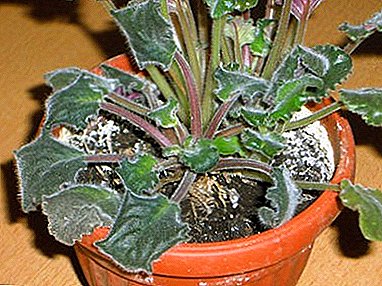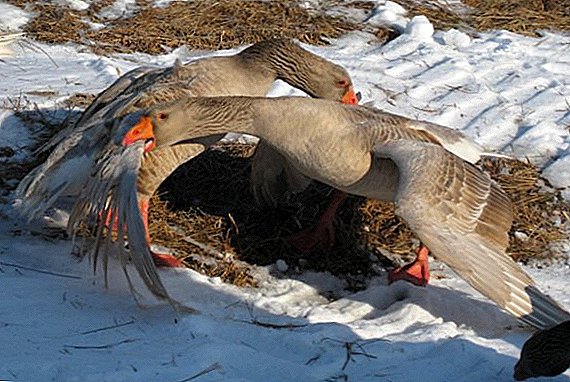 Different sources contain contradictory information about whether salt should be added to the diet of chickens. Quite often you can hear the statement that it is harmful to the body of the bird. There is information from the poultry farmers when, as a result of its eating, birds got poisoned, which led to their death. The fact that this is true, and that is fiction, and whether it is possible to actually feed domestic chickens with salt - let's get to the bottom together.
Different sources contain contradictory information about whether salt should be added to the diet of chickens. Quite often you can hear the statement that it is harmful to the body of the bird. There is information from the poultry farmers when, as a result of its eating, birds got poisoned, which led to their death. The fact that this is true, and that is fiction, and whether it is possible to actually feed domestic chickens with salt - let's get to the bottom together.
Is it possible to give chickens salt
The daily ration of laying hens is a matter that needs to be approached with the utmost seriousness, since the health and health of the chicken, and hence its performance, depends on the feed.
Did you know? Chickens can swallow food only in an upright position. Food enters the stomach not through muscle work, but due to gravity.Experienced poultry farmers give a list of products that need to be included in food for domestic birds. Quite often, in the approximate menu for the day, table salt is also spelled out as its important component along with chalk and mineral additives. But what about the fact that veterinarians in one voice claim that it is harmful to birds, and its use is at risk of not only health, but also for the life of the bird.
 Yes indeed, salt for chickens is undesirable, but in large quantities. In the same doses in which it is recommended by poultry farmers - 0.5 g - it does not bear harm and danger. It is a mineral supplement to the basic diet. By the way, it is not necessary if chickens have the opportunity to walk every day and independently feed themselves, as well as when fed with commercial feed.
Yes indeed, salt for chickens is undesirable, but in large quantities. In the same doses in which it is recommended by poultry farmers - 0.5 g - it does not bear harm and danger. It is a mineral supplement to the basic diet. By the way, it is not necessary if chickens have the opportunity to walk every day and independently feed themselves, as well as when fed with commercial feed.Find out if you can feed the chicken with bread.
What is the use
The chemical compound NaCl is necessary for the normal functioning of the body of domestic chicken. It helps to maintain water-salt balance at the level, as well as disinfects the body, inhibiting the development of pathogenic intestinal flora, has a positive effect on the health of the bird, its productivity, bone formation, metabolic processes. Lack of sodium leads to abnormalities in cardiac activity, the work of the digestive tract, adversely affects the nervous system and muscle tissues.
Be sure to introduce this element in the feed of hens, which are deprived of the opportunity to daily walk on the street.
Important! Salt is known to increase thirst. Therefore, in constant access chickens should have fresh clean drinking water (both in the chicken coop and in the open-air cage). It is important to ensure that the drinkers are not contaminated. Constant thirst can also provoke a decline in egg production.
During the growth period, chickens especially need sodium. They can get it from mineral supplements, greens (for example, dandelion, plantain, sorrel, clover) and from salt. It is also believed that salt helps to improve the appetite of poultry. In addition, salted food is more tasty and better eaten by birds.  Sodium chloride is also needed for chickens. Sometimes at the age of 21-45 days they begin to peck each other to bloody wounds. This indicates that the young body does not have enough sodium. It is necessary either to transfer them to high-quality compound feed, or to give them to drink a weak water-salt solution.
Sodium chloride is also needed for chickens. Sometimes at the age of 21-45 days they begin to peck each other to bloody wounds. This indicates that the young body does not have enough sodium. It is necessary either to transfer them to high-quality compound feed, or to give them to drink a weak water-salt solution.
To feed the body of chickens with nutrients, it is necessary to introduce the necessary vitamins and premixes in the diet.
How can harm
When consuming salt in large quantities in a chicken, severe poisoning occurs and is often fatal. A dose sufficient to cause the death of a bird is 3.5-4.5 g per 1 kg of weight. Intoxication develops 4 days after consuming an increased amount of salt.
Signs of NaCl poisoning are as follows:
- intense thirst;
- vomiting;
- restless behavior;
- heavy breathing;
- change in skin color to red or blue;
- lack of coordination of movements.
If you have noticed similar symptoms in your birds, and there is a suspicion that they could consume an increased amount of salt, you should urgently give them a drink.
Find out what amount of feed a hen needs per day, as well as how to make feed for chickens on your own.
If the birds are not able to drink on their own, you need to water them forcibly, opening the beak and filling the liquid with a syringe.  After otpaivaniya start feeding chickens with decoction of flaxseeds, potassium chloride, glucose. Be sure to consult a veterinarian.
After otpaivaniya start feeding chickens with decoction of flaxseeds, potassium chloride, glucose. Be sure to consult a veterinarian.
Did you know? The smallest egg weighed just over 2.5 grams, and this record was recorded in China.
How and how much salt to give chickens
For layers related to all directions, i.e. egg, meat and meat-egg, in any season it is advisable to add to the food 0.5 g of salt per day per individual. If we talk about the weight of feed, then 1 kg should account for 3-4 g of salt. It is added to wet mash (mixed fodder with vegetables) and porridge. 
It is useful to know how to feed the chickens with grass.
Thus, the approximate daily ration of one bird may look as follows:
- 120 grams of grain;
- 30 g of wet mash;
- 100 g of boiled potatoes;
- 7 g of oilcake;
- 3 g of chalk;
- 2 g of bone meal;
- 1 g yeast;
- 0.5 g of salt.
Important! The amount of feed depends on the breed, the age of the chicken and the time of year. It is forbidden to eat salted fish, cucumbers, cabbage, tomatoes and other products from the common table, containing an increased amount of salt.Thus, despite the fact that veterinarians report the dangers of salt to the health of chickens, they need this supplement if there is no aviary for walking birds on the farm. It should be administered in micro doses, in no case exceeding the recommended daily allowance. Only in this case will the body of the hen benefit in the form of sodium replenishment. Chickens who can walk around and look for foothills throughout the day on their own, or feed on special purchased feeds, do not necessarily mix in salt.
Reviews
Now, as for the justification. If you do not use feed or feed additives, then in the diet of chickens (grain, greens ...) sodium chloride (table salt) is practically absent. But the blood of animals and birds is a salted solution. In addition, salt inhibits the activity of intestinal parasites (for this purpose, herbivores lick salt). You can, of course, surf the net and search for clever scientific calculations on this topic, but laziness.













